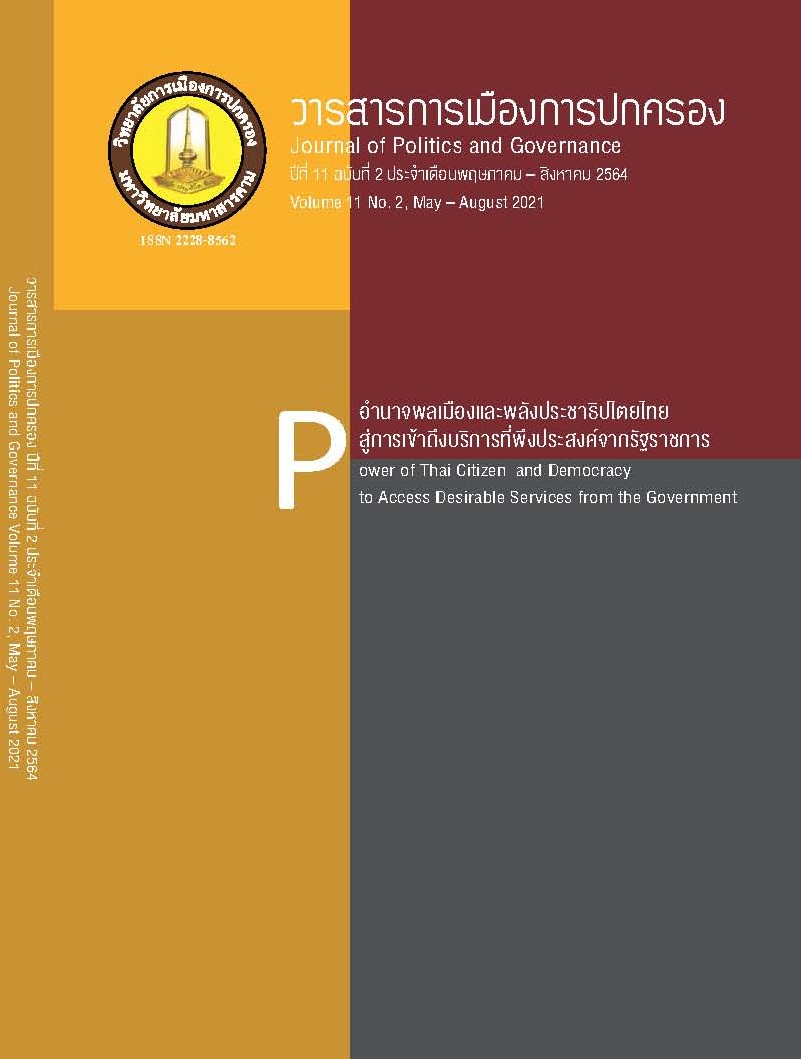Legal Issues in Children's Right Protection from Being Photographed for Publishing in Online Media
Main Article Content
Abstract
The objectives of this study were (1) to study the legal issues in the Children’s Privacy Rights Protection Act concerning children who have photographs taken by family members, parents, close relatives, or other people. And where their pictures are displayed on online media; (2) to study the legal issues in the Children’s Privacy Rights Protection Act concerning those who are photographed without permission and in case of young children who are still unable to provide consent. Child Protection Act, B.E. 2546 (2003), was studied for carrying out the two objectives. The results indicated that there are two loopholes in children’s privacy protection according to the Child Protection Act, B.E. 2546 (2003), Section 27. Firstly, the legal provision states, “Do not advertise or broadcast information about children to cause damages.” Even though parents or other people photograph children and publish online without harmful intent towards the children, it may harm the children in some way. For example, it could be the way for a malefactor or ill-intentioned person to easily trace the children leading to a criminal act where the children are the victims. Secondly, despite children’s photographs being posted on online media with/without consent or with/without ill-intention of causing harm to children, online media are not a private area; namely, it is a public place where anyone can comment; this could support cyber bullying. After studying the act, the researcher suggests that there should be a revision to the Child Protection Act, B.E. 2546, to cover both the incidences mentioned above and contingencies put in place to protect children’s privacy human rights to prevent encroachment by family members or other individuals.
Article Details
References
กุลพล พลวัน. (2527). สิทธิมนุษยชนกับสหประชาชาติ. กรุงเทพฯ : (ม.ป.ท).
คณาธิป ทองรวีวงศ์. (2559). ร่าง พ.ร.บ.คอมฯ ระบุชัด ให้กรรมการ 5 คน สั่งปิดเว็บขัดศีลธรรมอันดี, การไม่ลบข้อมูลเป็นความผิด เพราะคนมี “สิทธิที่จะถูกลืม”. สืบค้นจาก https://law.or.th/node/4337
ชุลีพร น่วมทะนง. สิทธิมนุษยชนกับการคุ้มครองข้อมูลส่วนบุคคล. วิทยาลัยรัฐธรรมนูญ: สำนักงานศาลรัฐธรรมนูญ. กรุงเทพฯ.
ชื่นอารี มาลีศรีประเสริฐ. (2539). การคุ้มครองสิทธิส่วนตัวกับการสื่อสารสนเทศ. (วิทยานิพนธ์ นิติศาสตรมหาบัณฑิต). จุฬาลงกรณ์มหาวิทยาลัย. กรุงเทพฯ.
ทิพาพร นะมาตร์. (2551). สิทธิความเป็นอยู่ส่วนตัว : ศึกษากรณีสิทธิความเป็นอยู่ส่วนตัวของบุคคลสาธารณะ. (วิทยานิพนธ์นิติศาสตรมหาบัณฑิต). มหาวิทยาลัยธุรกิจบัณฑิตย์, กรุงเทพฯ.
บุญยศิษย์ บุญโพธิ์. (2553). สื่อมวลชนกับการละเมิดสิทธิในความเป็นส่วนตัว. Executive Journal. สืบค้นจาก https://www.bu.ac.th/knowledgecenter/executive_journal/ oct_dec_09/pdf/86-88.pdf
พนิดา พูลสวัสดิ์. (2556). มาตรการทางกฎหมายในการคุ้มครองข้อมูลส่วนบุคคลของเด็กบนเครือข่ายอินเตอร์เน็ต. (วิทยานิพนธ์นิติศาสตรมหาบัณฑิต). สถาบันบัณฑิตพัฒนบริหารศาสตร์, กรุงเทพฯ.
สุรินรัตน์ แก้วทอง. (2562). กฎหมายคุ้มครองข้อมูลส่วนบุคคลของเด็กและเยาวชน. คอลัมน์ กฎหมาย 4.0. สืบค้นจาก https://www.bangkokbiznews.com/blog/detail/647319.
Das Kunsturhebergesetz und das Recht am eigenen Bild. Retrieved from https://www.urheberrecht.de/kunsturhebergesetz/
Juliane Böcken, Urheberrecht vs. Persönlichkeitsrecht. Retrieved from https:// www.rechtambild.de/ 2015 /01/urheberrecht-vs-persoenlichkeitsrecht/
Justin Huggler. (2016). Austrian teenager sues parents for 'violating privacy' with childhood Facebook pictures. The Telegraph.
Haben Kinder ein Recht am eigenen Bild?. Retrieved from https://www.arag.de/auf-ins-leben/internetrecht/recht-am-eigenen-bild-kinder/.
Martin Boden & Jan-Thlman Uhe, Die Persönlichkeitsrechte von Kindern gehören nicht allein den Eltern. Retrieved from https://www.boden-rechtsanwaelte.de/die-persoenlichkeitsrechte-von-kindern-gehoeren-nicht-allein-den-eltern/.
Samuel D. Warren & Louis D. Brandeis. (1890). The Right to Privacy. Harvard Law Review.
William H.Mamell. (1973). The Right to know : Media and the Common Good.
William Prosser. (1973). Torts: Case and Materials.


